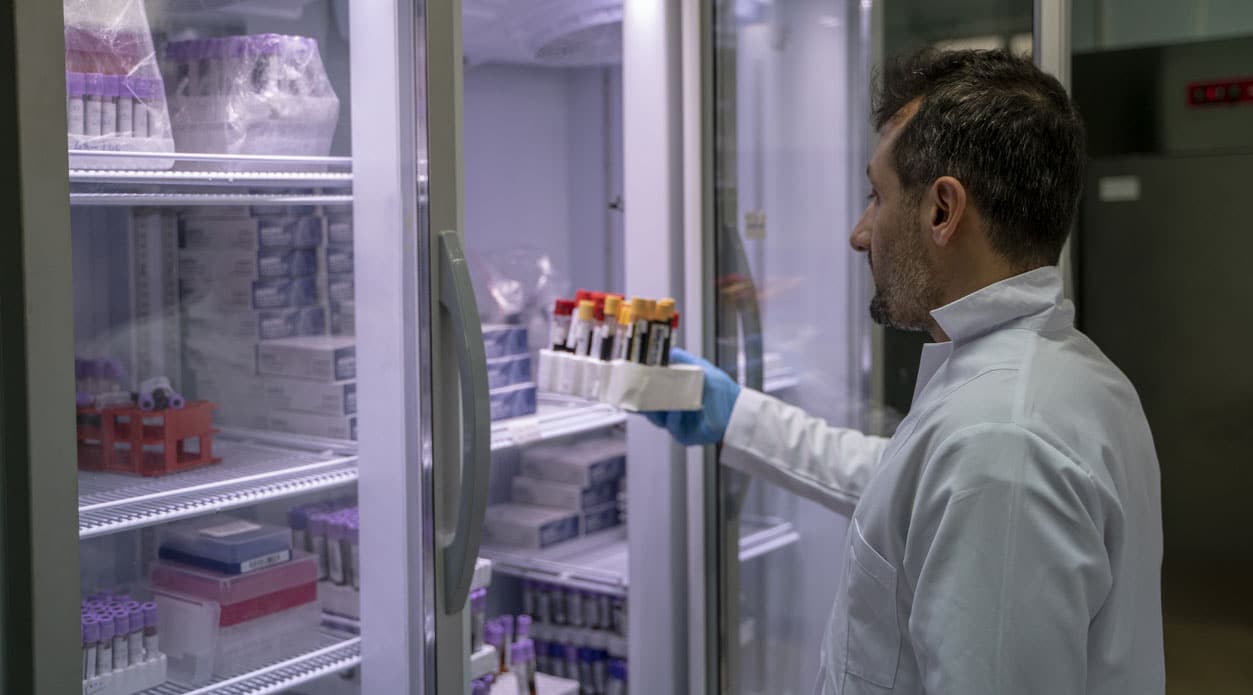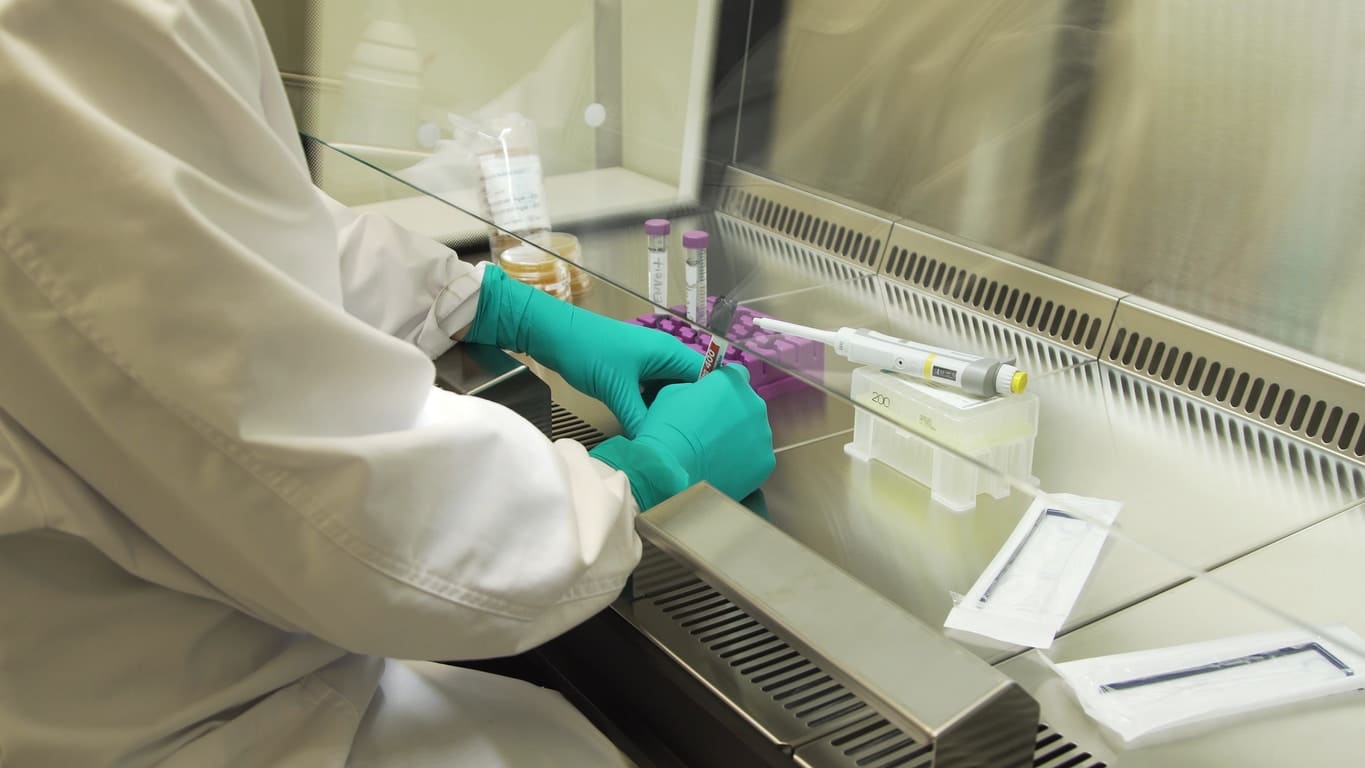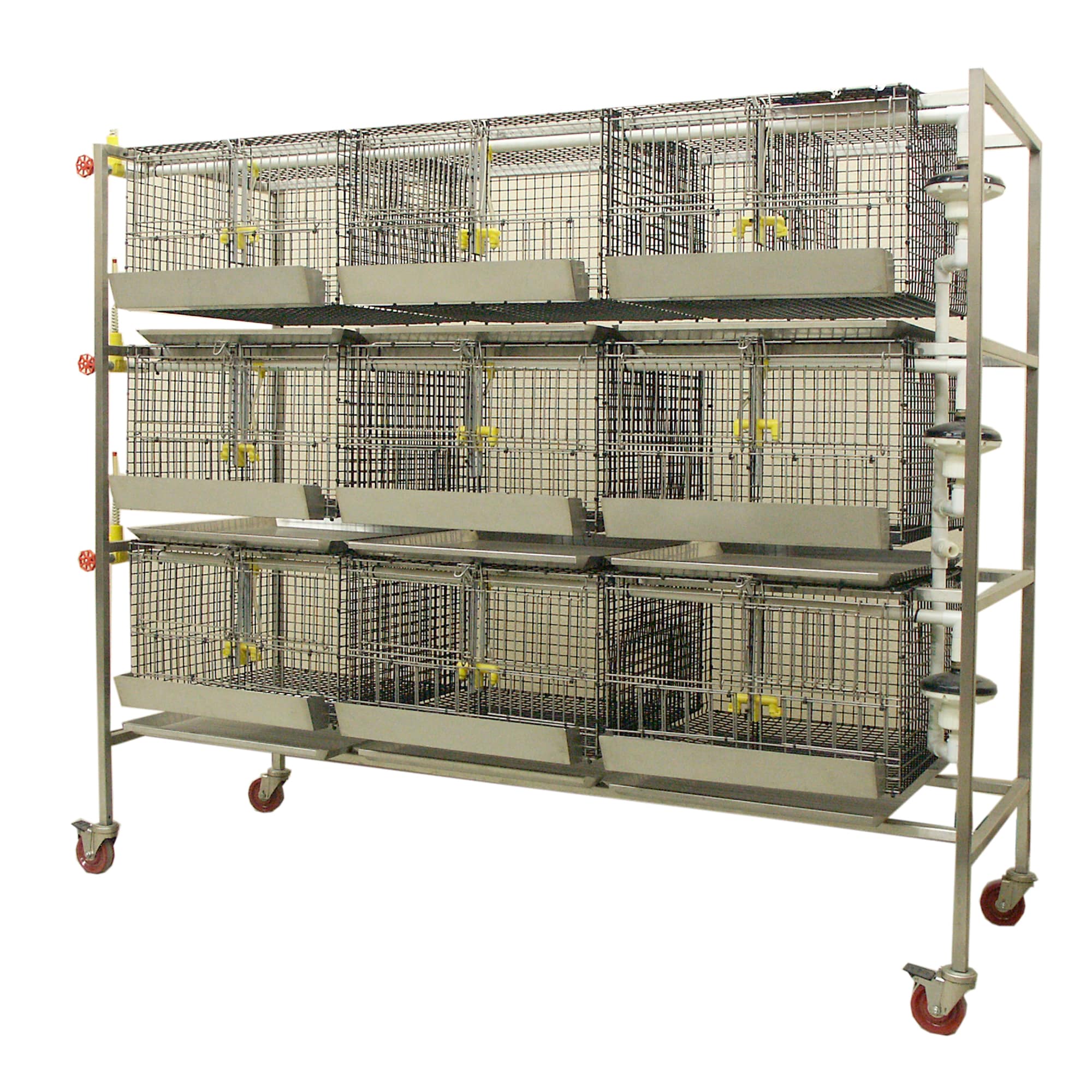Key Factors of a Medical Refrigerator for Vaccine Storage
Choosing the right medical refrigerator is necessary to ensure the safety and efficacy of vaccines. Without the correct temperatures and operating conditions, vaccines can degrade and lose their potency, resulting in reduced effectiveness or even causing harm to a patient. According to the CDC’s vaccine storage guidelines, proper cold chain management is critical for maintaining vaccine viability. Let’s examine the essential features of a medical refrigerator and why each is important for vaccine storage.
Capacity and Storage Configuration
Depending on the setting and the demand for vaccines, the capacity of a refrigerator will impact the future growth of the pharmacy. Having enough space will ensure vaccines are not stored inaccurately or left to degrade. Upright refrigerators offer various capacity options, from compact undercounter units for smaller clinics to large-capacity models for high-volume pharmacies and hospital settings.
Consider not only current vaccine inventory but also:
- Anticipated growth in vaccine programs
- Seasonal demand fluctuations (flu season, for example)
- Emergency preparedness requirements
- Space for proper air circulation between stored items
- Shelf configuration flexibility for different vaccine packaging sizes
Ease of Use and Accessibility
Medical refrigerators must be easy to use because, in busy pharmaceutical settings, one error could be costly. User-friendly controls are vital, and an alarm system should be fitted in case of a power failure or if the door is left open. Additionally, the refrigerator door needs to open and close easily but must have a solid seal to maintain the required temperatures.
Key usability features include:
- Digital displays for at-a-glance temperature monitoring
- Intuitive control panels with clear labeling
- Self-closing doors with magnetic seals to prevent accidental temperature excursions
- Interior lighting for easy vaccine identification
- Adjustable shelving to accommodate various vaccine container sizes
- Lockable doors for security and controlled access
Energy Efficiency and Environmental Impact
Energy-efficient instruments are crucial for reducing energy consumption, costs, and environmental impact. When choosing a medical refrigerator, look for units with excellent energy ratings and check whether they use environmentally-friendly refrigerants. Modern refrigeration technology has made significant advances in energy efficiency without compromising temperature stability.
The ARES Cool line of laboratory and pharmacy refrigerators utilizes natural hydrocarbon refrigerants like R290 or R600a, which offer:
- Reduced global warming potential
- Compliance with EPA and SNAP environmental guidelines
- Lower operating costs through reduced energy consumption
- Exceptional cooling efficiency
- Sustainable operation aligned with green healthcare initiatives
Precise Temperature Control and Monitoring
Temperature controls and monitoring systems are critical for safely storing vaccines, which is why commercial-grade medical refrigerators are required. Medical refrigerators must be able to operate between 2°C and 8°C, as the ideal temperature for storing vaccinations is 5°C, and it is imperative that vaccines are not frozen.1 Even brief temperature excursions outside this range can compromise vaccine potency.
Essential temperature control features include:
- Microprocessor-based temperature management for precise control within ±0.5°C
- Multiple temperature probes to monitor conditions throughout the cabinet
- Digital temperature displays showing real-time readings
- High and low temperature alarms (both audible and visual)
- Data logging capabilities for regulatory compliance documentation
- Remote alarm contacts for off-site monitoring
- Battery backup for alarm systems during power outages
For comprehensive cold chain management, consider implementing environmental monitoring systems that provide real-time temperature tracking and automated alerts.
CDC and Regulatory Compliance
Medical refrigerators used for vaccine storage must meet strict regulatory requirements set by the CDC and state health departments. The CDC’s Vaccine Storage and Handling Toolkit provides detailed guidelines for proper vaccine refrigeration, including:
- Temperature range of 2°C to 8°C (36°F to 46°F)
- Use of purpose-built or pharmaceutical-grade units (not household refrigerators)
- Temperature monitoring at least twice daily
- Documentation of temperature readings
- Proper placement away from walls and heat sources
- Adequate air circulation around stored vaccines
Understanding why laboratory refrigerators differ from consumer appliances is crucial for maintaining compliance and ensuring vaccine integrity. Learn more about medical-grade refrigeration standards in our comprehensive guide.
Additional Considerations for Vaccine Storage
Beyond the core features mentioned above, several other factors should influence your medical refrigerator selection:
Glass vs. Solid Doors
While glass doors allow visual inventory checks without opening the unit (minimizing temperature fluctuations), solid doors provide better insulation and are preferred for the most temperature-sensitive vaccines. Consider your workflow and vaccine types when making this decision.
Defrost Systems
Auto-defrost refrigerators offer convenience but can cause temperature fluctuations during defrost cycles. For critical vaccine storage, consider units with controlled auto-defrost technology that minimizes temperature variations or manual defrost options that provide the most stable temperatures.
Space and Placement
Proper placement of your medical refrigerator is essential. Avoid locations near:
- Direct sunlight or heat sources
- HVAC vents
- High-traffic areas where doors may be bumped
- Areas prone to temperature fluctuations
Ensure adequate clearance around the unit for ventilation and maintenance access.
Why Household Refrigerators Are Not Suitable for Vaccine Storage
The CDC explicitly recommends against using household-grade refrigerators for vaccine storage for several critical reasons:
- Temperature instability: Household units have wider temperature fluctuations and inconsistent temperatures throughout the cabinet
- Auto-defrost cycles: Cause periodic temperature spikes that can damage vaccines
- Inadequate monitoring: Lack precise temperature displays and alarm systems
- Poor air circulation: Results in hot and cold spots within the storage area
- Inferior insulation: Less effective at maintaining stable temperatures during power fluctuations or door openings
For a detailed comparison, read our article on laboratory refrigeration vs. consumer appliances.
ARES Cool: Purpose-Built Medical Refrigerators for Vaccine Storage
ARES Scientific supplies a wide range of innovative and reliable scientific equipment worldwide. Our team is filled with experts from different scientific fields, and they provide the scientific community with support in identifying and implementing the most suitable instruments for their applications.
The ARES Cool line of medical-grade refrigerators represents the perfect solution for pharmaceutical and healthcare facilities requiring reliable vaccine storage. Our refrigerators are specifically engineered to meet CDC guidelines and exceed industry standards for temperature stability, monitoring, and reliability.
ARES Cool Medical Refrigerator Features
ARES Cool refrigerators deliver the performance and reliability required for critical vaccine storage applications. Key features include:
Precision Temperature Management
- Operating range: 2°C to 8°C (36°F to 46°F) – ideal for vaccine storage
- Microprocessor-based control: Maintains temperatures within ±0.5°C of setpoint
- Digital LED display: Real-time temperature monitoring in Celsius or Fahrenheit
- Multiple temperature probes: Strategic placement ensures uniform temperature throughout the cabinet
Advanced Alarm Systems
- High and low temperature alarms: Both audible and visual alerts
- Door ajar alarm: Alerts staff if door remains open
- Power failure alarm: Battery-backed system continues monitoring during outages
- Remote alarm contacts: Integration with facility management systems
Sustainable and Efficient Design
- Eco-friendly refrigerants: Natural hydrocarbon refrigerants (R290/R600a)
- High-density insulation: Reduces energy consumption while maintaining temperature stability
- Efficient compressors: Minimize power usage and operating costs
- Energy-efficient design: Helps reduce your facility’s carbon footprint
Durable Construction
- Stainless steel exterior: Easy to clean and maintain, meets hygiene standards
- Heavy-duty hinges: Withstand frequent use in busy pharmacy environments
- Magnetic door seals: Ensure airtight closure and temperature stability
- Reinforced shelving: Adjustable to accommodate various vaccine container sizes
Security and Access Control
- Keyed door locks: Prevent unauthorized access to controlled medications
- Interior LED lighting: Improve visibility without generating excess heat
- Glass or solid door options: Choose based on your facility’s needs
ARES Cool Capacity Options
The ARES Cool line offers multiple capacity options to suit various healthcare settings:
- Undercounter models (1-6 cu. ft.): Perfect for small clinics, physician offices, and point-of-care locations
- Mid-size units (12-23 cu. ft.): Ideal for pharmacies, urgent care centers, and medium-volume facilities
- Large-capacity refrigerators (up to 49 cu. ft.): Suitable for hospitals, large pharmacies, and high-volume vaccination centers
- Combination refrigerator/freezer units: Provide both refrigerated and frozen storage in a single footprint
Choosing the Right ARES Cool Model for Your Facility
Selecting the appropriate medical refrigerator depends on several factors specific to your operation:
Small Clinics and Physician Offices
For smaller facilities with limited space and moderate vaccine volumes, compact undercounter models provide excellent performance in a space-saving design. These units can be integrated into existing cabinetry while delivering the same precise temperature control as larger models.
Community Pharmacies
Mid-size ARES Cool refrigerators offer the ideal balance of capacity and footprint for retail pharmacy settings. With glass door options, pharmacists can quickly verify inventory without compromising temperature stability.
Hospitals and Large Healthcare Systems
High-capacity units with multiple compartments allow for organized storage of various vaccine types. Large upright refrigerators provide the volume needed for mass vaccination programs and emergency preparedness stockpiles.
Mobile and Outreach Vaccination Programs
For facilities requiring both refrigerated and frozen storage, combination units offer flexibility while maintaining independent temperature control in each compartment.
Best Practices for Medical Refrigerator Implementation
Installation and Setup
- Allow proper clearance: Follow manufacturer guidelines for ventilation space around the unit
- Level the refrigerator: Ensures door seals properly and improves efficiency
- Run stabilization period: Allow 24 hours for the unit to reach stable operating temperatures before storing vaccines
- Install monitoring equipment: Set up temperature loggers and alarm systems
Daily Operations
- Check temperatures twice daily: Record readings at the beginning and end of each workday
- Maintain temperature logs: Document all readings for regulatory compliance
- Organize inventory: Use the “first expired, first out” (FEFO) system
- Minimize door openings: Plan access to reduce temperature fluctuations
- Keep doors closed: Train staff on proper access procedures
Maintenance Schedule
- Clean door seals regularly: Prevent air leaks and maintain efficiency
- Check alarm function monthly: Test all alarm systems to ensure proper operation
- Inspect temperature probes: Verify accuracy and proper placement
- Service compressor annually: Schedule professional maintenance to extend unit lifespan
- Review temperature logs: Identify trends that may indicate developing issues
Emergency Preparedness and Contingency Planning
Every facility should have a plan for protecting vaccines during emergencies:
- Backup power: Ensure refrigerators are connected to emergency generators or have battery backup systems
- Backup storage: Identify alternative storage locations in case of equipment failure
- Temperature excursion protocol: Establish procedures for responding to out-of-range temperatures
- Contact list: Maintain current contact information for manufacturers, service providers, and health departments
- Vaccine rescue kit: Keep coolers, ice packs, and temperature monitors readily available
For comprehensive guidance on maintaining cold chain integrity, explore our resources on pharmaceutical temperature monitoring.
Regulatory Compliance and Documentation
Maintaining proper documentation is essential for regulatory compliance and quality assurance:
Required Documentation
- Temperature logs: Daily recordings of refrigerator temperatures
- Calibration certificates: Annual calibration records for monitoring equipment
- Maintenance records: Documentation of all service and repairs
- Alarm event logs: Records of temperature excursions and corrective actions
- Staff training documentation: Proof of training on proper storage procedures
Inspection Readiness
Be prepared for inspections by:
- Maintaining organized, readily accessible records
- Ensuring equipment meets current CDC guidelines
- Verifying staff knowledge of storage protocols
- Demonstrating proper vaccine handling procedures
- Showing evidence of regular equipment maintenance
Investment Considerations and Total Cost of Ownership
While purpose-built medical refrigerators represent a higher initial investment than household units, the total cost of ownership tells a different story:
Direct Cost Savings
- Energy efficiency: Lower utility bills through advanced refrigeration technology
- Reduced vaccine waste: Proper temperature control prevents costly vaccine spoilage
- Longer equipment lifespan: Commercial-grade construction ensures years of reliable service
- Lower maintenance costs: Fewer repairs and service calls
Indirect Benefits
- Regulatory compliance: Avoid penalties and failed inspections
- Patient safety: Ensure vaccine efficacy and prevent adverse events
- Reputation protection: Maintain your facility’s credibility and standing
- Peace of mind: Confidence in your vaccine storage infrastructure
Learn more about features to look for in laboratory refrigerators and how they contribute to long-term value.
Staff Training and Standard Operating Procedures
Even the best medical refrigerator requires properly trained staff to maintain vaccine integrity. Develop comprehensive standard operating procedures (SOPs) covering:
Initial Training Topics
- Importance of proper vaccine storage
- Temperature monitoring procedures
- Alarm response protocols
- Proper vaccine placement and organization
- Documentation requirements
- Emergency procedures
Ongoing Education
- Annual refresher training
- Updates on new vaccines and storage requirements
- Review of temperature excursion events
- Equipment updates and new features
Conclusion: Invest in Reliable Vaccine Storage
Choosing the right medical refrigerator for vaccine storage is a critical decision that directly impacts patient safety, regulatory compliance, and operational efficiency. The key factors to consider—capacity, ease of use, energy efficiency, and precise temperature control—are all addressed in the ARES Cool line of purpose-built medical refrigerators.
By selecting ARES Cool refrigerators from ARES Scientific, you’re investing in:
- CDC-compliant temperature control
- Reliable performance backed by expert support
- Sustainable, energy-efficient operation
- Long-term value and peace of mind
- Protection of your most critical assets—the vaccines that protect your patients
Don’t compromise on vaccine storage. Contact ARES Scientific today to discuss your specific requirements and learn how our team of experts can help you select the perfect ARES Cool medical refrigerator for your facility. Our specialists are ready to guide you through the selection process, answer your questions, and ensure you have the right cold storage solution for your vaccine storage needs.
Related Resources for Vaccine and Pharmaceutical Storage
- Laboratory Refrigeration vs. Consumer Appliances: Key Differences Explained
- Demystifying Medical-Grade Refrigeration
- Real-Time Temperature Monitoring in Clinical and Research Laboratories
- Pharma Manufacturing: Why Real-Time Monitoring Matters
- What Features Are Most Important When Selecting a Blood Bank Refrigerator?
- 6 Ideal Features of New Laboratory Refrigerators
- How Today’s Best -80°C ULT Freezers Use 70% Less Energy




